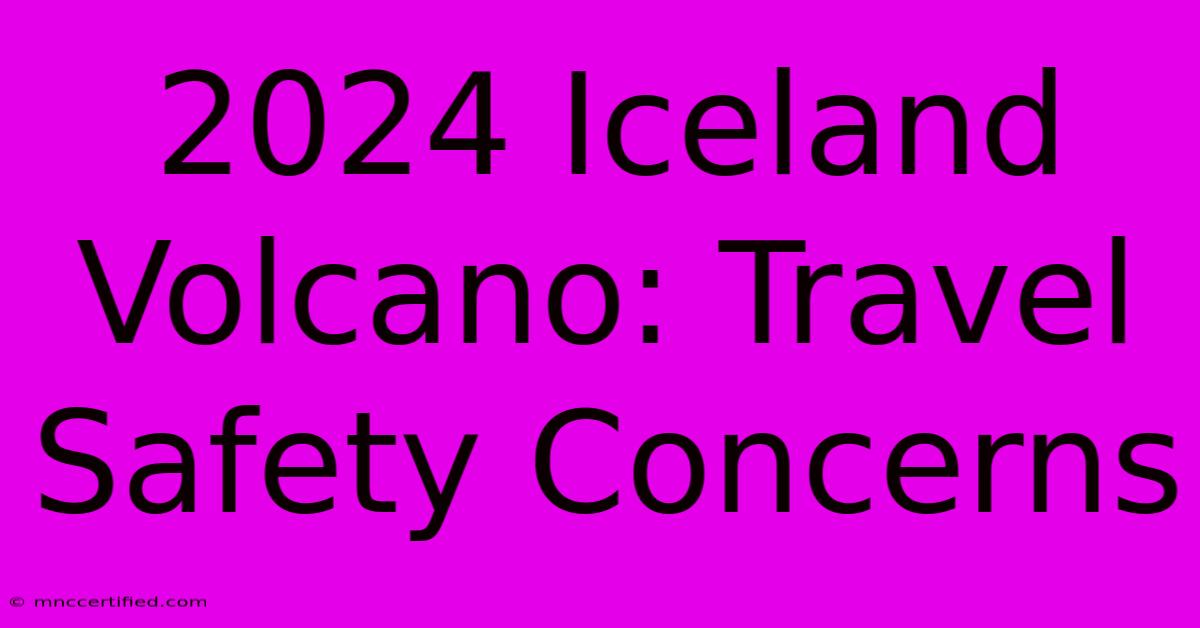2024 Iceland Volcano: Travel Safety Concerns

Table of Contents
2024 Iceland Volcano: Travel Safety Concerns & How to Stay Informed
Iceland's dramatic landscape, sculpted by volcanic activity, draws millions of tourists annually. However, the inherent geological activity also presents potential risks. With the possibility of volcanic eruptions in 2024, understanding the safety concerns and planning accordingly is crucial for a safe and enjoyable trip. This article will explore the potential hazards, provide safety tips, and guide you on how to stay informed about volcanic activity in Iceland.
Understanding Iceland's Volcanic Activity
Iceland sits on the Mid-Atlantic Ridge, a boundary between two tectonic plates. This geological setting makes it one of the most volcanically active regions on Earth. While eruptions aren't constant, they are a recurring feature of the Icelandic landscape. Predicting eruptions precisely remains challenging, although scientists constantly monitor seismic activity and other indicators to provide warnings.
Types of Volcanic Hazards in Iceland:
- Lava Flows: Slow-moving but destructive, lava flows can engulf infrastructure and land. While generally not immediately life-threatening, they can cause significant damage and disrupt travel.
- Ash Clouds: Volcanic ash presents a serious threat to aviation. Ash clouds can disrupt air travel, leading to flight cancellations and delays. Inhalation of ash can also be harmful to human health.
- Gas Emissions: Volcanic gases, such as sulfur dioxide, can be toxic and pose a health risk, especially to those with respiratory problems. These gases can travel long distances, impacting air quality in wider areas.
- Jökulhlaups (Glacial Outbursts): Eruptions beneath glaciers can trigger sudden and devastating glacial floods, called jökulhlaups. These floods can carry enormous amounts of water, ice, and debris, causing widespread destruction.
Travel Safety Concerns and Precautions for 2024
Planning a trip to Iceland in 2024 requires careful consideration of volcanic risks. Here's how to mitigate those concerns:
1. Monitor Official Sources:
Before and during your trip, stay updated on volcanic activity through official sources:
- The Icelandic Meteorological Office (IMO): The IMO provides real-time updates on seismic activity, volcanic eruptions, and other natural hazards. This is your primary source of information.
- Safetravel.is: This website offers valuable travel information and safety advice, including updates on volcanic activity and potential disruptions.
- Local News: Keep an eye on Icelandic news outlets for the latest updates.
2. Travel Insurance:
Comprehensive travel insurance is essential for any trip to Iceland, especially during periods of potential volcanic activity. Ensure your policy covers emergency evacuation, medical expenses, and trip disruptions caused by natural disasters.
3. Plan Your Itinerary Carefully:
Avoid areas near active volcanoes or those with a history of recent eruptions. Consult the IMO website and other official sources to identify high-risk zones. Consider alternative routes or activities if necessary.
4. Pack Appropriately:
Pack appropriate clothing and gear for all weather conditions. Volcanic ash can cause respiratory problems, so consider packing a dust mask. Having sturdy footwear is crucial, especially when exploring potentially uneven terrain.
5. Heed Official Warnings:
If an eruption occurs or an official warning is issued, follow instructions from local authorities and emergency services immediately. Evacuation orders should be obeyed without delay.
6. Learn Basic Icelandic Phrases:
Knowing basic phrases related to safety and emergencies can be helpful in case of unforeseen circumstances.
Off-Page SEO Strategies for this Article:
To boost the article's ranking, consider these off-page SEO strategies:
- Guest Blogging: Contribute articles about Iceland travel and safety to relevant travel blogs and websites.
- Social Media Promotion: Share the article on social media platforms like Facebook, Twitter, and Instagram, using relevant hashtags like #IcelandTravel, #IcelandVolcano, #TravelSafety.
- Backlinks: Build high-quality backlinks from reputable websites in the travel and safety sectors.
- Community Engagement: Participate in online forums and communities related to Iceland travel and share valuable insights.
By combining well-written, informative content with a robust off-page SEO strategy, you can effectively increase the visibility of your article and help travelers stay safe while experiencing the beauty of Iceland. Remember to always prioritize safety and adhere to official guidelines when traveling to volcanically active regions.

Thank you for visiting our website wich cover about 2024 Iceland Volcano: Travel Safety Concerns. We hope the information provided has been useful to you. Feel free to contact us if you have any questions or need further assistance. See you next time and dont miss to bookmark.
Featured Posts
-
Will Insurance Cover An Old Roof
Nov 22, 2024
-
Wagner Scores 37 Clutch 3 Pointer Wins
Nov 22, 2024
-
Juventus Out Arsenal Through Hurtig
Nov 22, 2024
-
Epic Insurance Lafayette Indiana
Nov 22, 2024
-
Steelers Fall To Browns 24 19
Nov 22, 2024